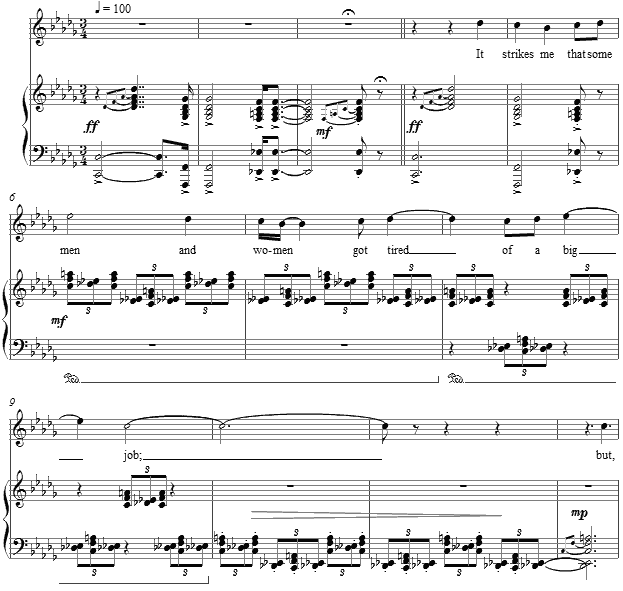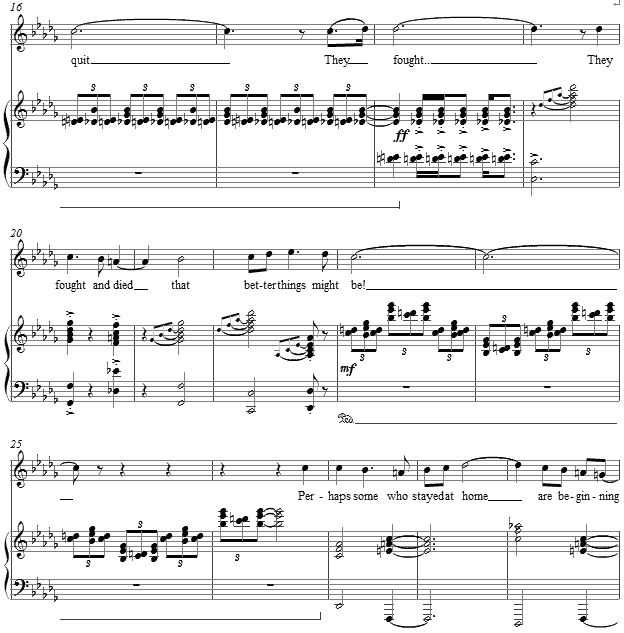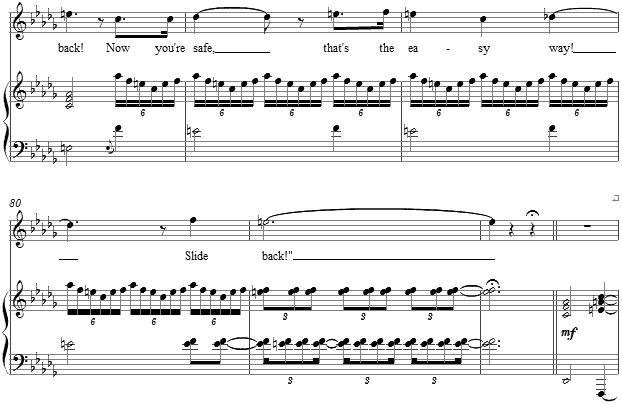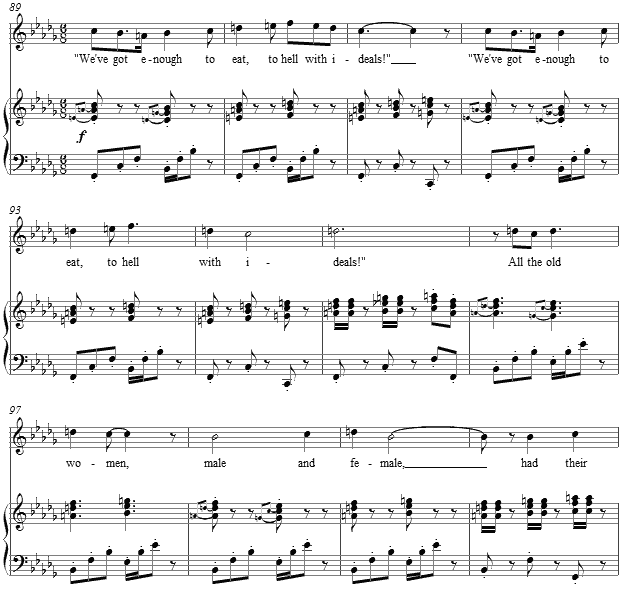Music and Texts of GARY BACHLUND
Vocal Music | Piano | Organ | Chamber Music | Orchestral | Articles and Commentary | Poems and Stories | Miscellany | FAQs
...that better things might be - (2008)
Charles E. Ives
for medium voice and piano
It strikes me that
some men and women got tired of a big job; but, over there our men did not quit.
They fought and died that better things might be!
Perhaps some who stayed at home are beginning to forget and to quit.
The pocketbook and certain little things talked loud and noble, and got in the way;
too many readers go by the headlines, party men will muddle up the facts,
so a good many citizens voted as grandpa always did,
or thought a change for the sake of change seemed natural enough.
“It’s raining, let’s throw out the weatherman, kick him out! Kick him out! Kick him out! Kick him out! Kick him!”
Prejudice and politics, and the stand-patters came in strong, and yelled, “slide back! Now you’re safe, that’s the easy way!”
Then the timid smiled and looked relieved, “We’ve got enough to eat, to hell with ideals!”
All the old women, male and female, had their day today,
and the hog-heart came out of his hole; but he won’t stay out long,
God always drives him back!
Oh Captain, my Captain! A heritage we’ve thrown away;
but we’ll find it again, my Captain, Captain, oh my Captain! [ 1 ][ 9 pages, circa 4' 40" ]
Charles E. Ives
In a time between the great world wars, the American electorate proved itself weary of war itself, even though the nation would shortly again be drawn into another war unavoidably. Ives' title for his settings are known as An Election (It Strikes Me That...) as scored for "male (in unison) chorus and orchestra" and also November 2, 1920 which he self-published as "for Voice and Piano." Ives wrote his setting was to be sung as a "soliloquy of an old man whose son lies in Flander's Fields." [ 2 ] Some critics have noted the text reads as a "rant," though this is more a political estimation than an artistic one for dramas aplenty contain their "rants" with good and full reason. As to the citation of "Flander's Field," I set poet John McCrae's poignant text as well -- In Flander's Fields.
Ives' complaint is valid, as he complains of people who may have forgotten their duty to uphold freedom, have become too passive, and who seek merely the status quo. In this year, the US election for president was won under the mantle of "change," or as Ives says, "a change for the sake of change." In 1920 Harding won his presidential election and went on to lead a highly corrupt and ineffective administration having promised "change." The election of 1920 proved to have been indeed "change" but not to have been for the better. Oddly, after some years' involvement in the military actions in both Iraq and Afghanistan involving large coalitions of nations, to include both the United States and European nations, the electorate certainly seems to have either become or was overtly encouraged "to forget and to quit," in part fostered by a nostalgic yearning for the 1960s antiwar movement. And so this text leapt out at me as utterly modern, as pertinent today as it was when Ives first penned it. [ 3 ]
Set for a medium tessitura, the song swings between agitated gestures and long-lined choral structures, one giving way to the other much in the same way that societies -- and the United States in particular -- seem to vacillate between reaching out and withdrawing. The opening dissonances in B flat minor do not clearly identify the tonic for the seventh of these chords being at the bottom of the chord forms.
The overt approval of Ives for the sacrifice of those who would truly fight for freedom is accompanied with the agitation of the opening section. Suddenly this gives way to a harmonic and rhythmic change, more sedate and in a way lethargic.
As with the rancor which those who oppose militancy under even the most necessary of circumstances -- as the United States had been literally drawn into World War I, and only two decades would be drawn into a second World War -- the rancor of those who Ives shows as opposing those who "fought and died that better things might be" is characterized by the same seconds which mark the "time of war" which opens the setting.
Those who found complacency and surfeit enough to justify some kind of isolationist politics are painted in a 6/8 variation on the overall 3/4 meter of the work, the underlying eighth note being equal. This jaunty gesture with arpeggios and staccato touch underscores the lack of seriousness which permeated the political arguments then as in this year. Ives is most snide in his linking "old women" with some men as well as women, contrasting them to those who "fought and died." [ 4 ]
The setting ends with a reprise of the first section and a final, hard cadence in B flat minor.
The score for ...that better things might be is available as a free PDF download, though any major commercial performance or recording of the work is prohibited without prior arrangement with the composer. Click on the graphic below for this piano-vocal score.
...that better things might be
NOTES
[ 1 ] The citation is to Walt Whitman's tribute to the assassinated Abraham Lincoln in the following poem from Leaves of Grass (1900). For Ives, this citation is meant to point up the solidarity with all those who "fought and died" for freedom. The modern day antiwar movement has put forward empty slogans such as "war is not the answer," when in fact sadly war, as we saw with Lincoln, Wilson before the election of Harding, and Roosevelt afterwards was simply inescapable. Moreover the outcomes throughout brought the world closer toward the ideals of "freedom for all" as the decades pass. That such cultural icons as Charles Ives, Walt Whitman ( To the States ), Ambrose Bierce ( Freedom ), Carl Sandburg ( Government ), and so many more in our modern day such as Rummel ( Pray tell, my brother, why ) all stress that freedom is that for which one must "fight" makes visible the awareness that "fought and died" did so "that better things might be."
1
O Captain! my Captain! our fearful trip is done;
The ship has weather’d every rack, the prize we sought is won;
The port is near, the bells I hear, the people all exulting,
While follow eyes the steady keel, the vessel grim and daring:
But O heart! heart! heart!
O the bleeding drops of red,
Where on the deck my Captain lies,
Fallen cold and dead.
2
O Captain! my Captain! rise up and hear the bells;
Rise up—for you the flag is flung—for you the bugle trills;
For you bouquets and ribbon’d wreaths—for you the shores a-crowding;
For you they call, the swaying mass, their eager faces turning;
Here Captain! dear father!
This arm beneath your head;
It is some dream that on the deck,
You’ve fallen cold and dead.
3
My Captain does not answer, his lips are pale and still;
My father does not feel my arm, he has no pulse nor will;
The ship is anchor’d safe and sound, its voyage closed and done;
From fearful trip, the victor ship, comes in with object won;
Exult, O shores, and ring, O bells!
But I, with mournful tread,
Walk the deck my Captain lies,
Fallen cold and dead.[ 2 ] From Ives' self-published 114 Songs, page 50, his note for "Nov. 2. 1920" is as follows: "Soliloquy of an old man whose son lies in "Flanders Fields" It is the day after election; he is sitting by the roadside, Looking down the valley towards the station."
[ 3 ] An anecdote: At dinner the night before I completed this setting, some German friends asked directly where I felt most at home and most at peace. I answered that I am most at home in that land called "freedom." Having lived in many places throughout my career, I feel this most profoundly.
Freedom is defined best as "freedom from" many kinds of oppression, and among them most large is an invasive government such as that of National Socialism, Soviet Socialism and similar governments as the history of wars for freedom in the twentieth century has so well documented. For this I hold with Ives to honor those who "fought and died that better things might be."
[ 4 ] The notion of protest songs is remarkable, for there are those who would see a protest against war being a protest against all wars, where in fact Ives saw the distinction. In an audio recording by Charles Ives, he sings "They are There."
Part of this text reads: "Most wars are made by small, stupid, / selfish bossing groups, / While the People have no say, / But there'll come a day, / Hip, hip, hooray, / When they'll smash all dictators to the wall!" This most assuredly is not an early version of the bumper sticker and placard slogan, "War in not the answer," but rather a call to what has been termed through the ages the casus belli, the just war. Ives made a distinction in his own words as in this recording just mentioned, that a people must fight for freedom when it comes to that moment in time. Thus the last lines of text for his recorded song are, "For it's rally round the flag / of the People's New Free World, / Shouting the battle cry of freedom!" This is militant in a way and at the same time a protest; it is a protest against those "politicians" -- as his words testify -- who would not heed their people's democratic will.
A "free world" was the phrase used decades ago to contrast the West to the sphere of the Soviet Union and its Iron Curtain. Ives' call to us in his words and music is to be ever ready to fight for that free world, a people's world, in which the individualism of men such as Ives have a protected place, protected against reigning political trends and "all dictators." For this Ives' text affirms that "they fought and died that better things might be!"
The words of one such man were recently published in Der Spiegel, 3 April 2008, in an article titled "One Man's War On Terror, The American GI from Berlin," by Ullrich Fichtner. This German-born, American soldier, Berlin-born Jeffrey Jamaleldine is quoted as saying, "And what are you doing so that we can have peace? How much longer do you think you'd be sitting around drinking coffee in fancy Berlin cafés if people like me didn't exist? If there was nobody to make sure you could live in peace? If there was nobody to fight terrorism?"
This one man among many generations of men "fought" and so many "died" for freedom. That antiwar demonstrators may demonstrate freely in free nations testifies not to their coddled and protected antiwar sentiments expressed in free societies, but to such as Ives, Janameldine and literally millions like them who provided that freedom, for in totalitarian nations such demonstrations are crushed, and the absence of such antiwar protesters going to risk their own lives in such places testifies to the vapidity of their wholly risk-free argument.




